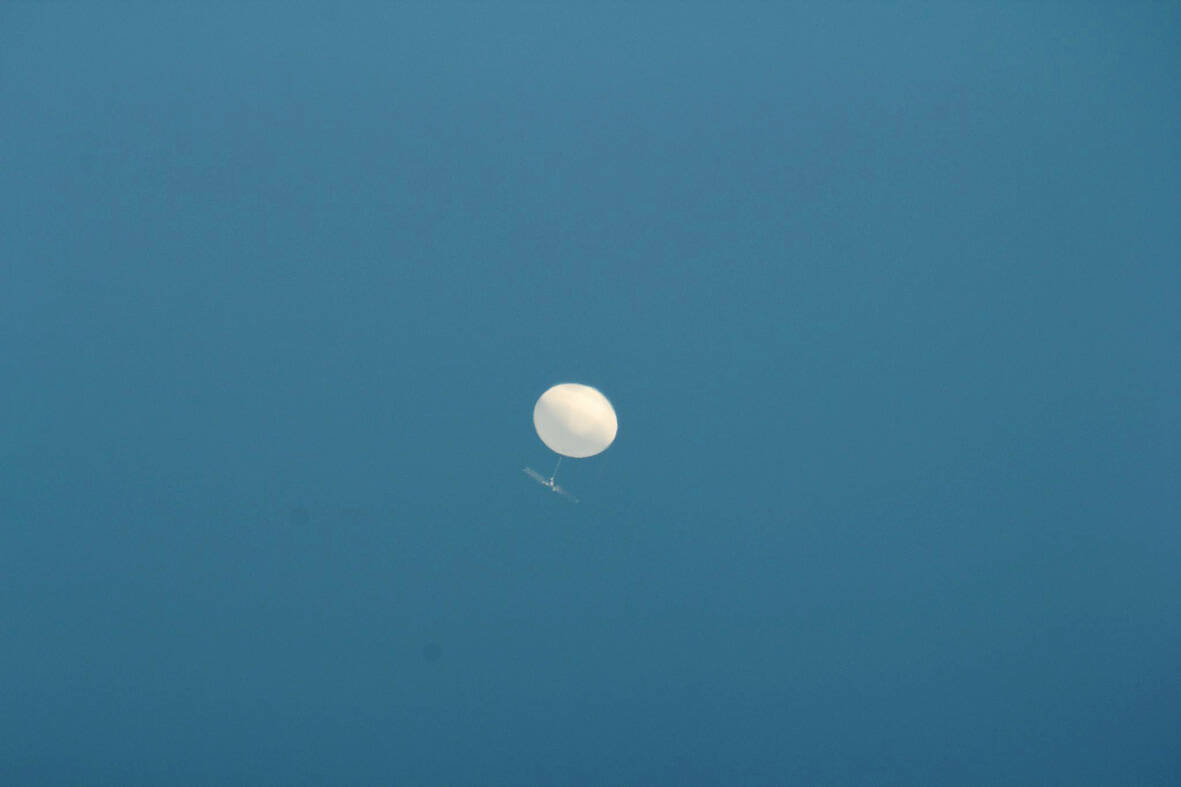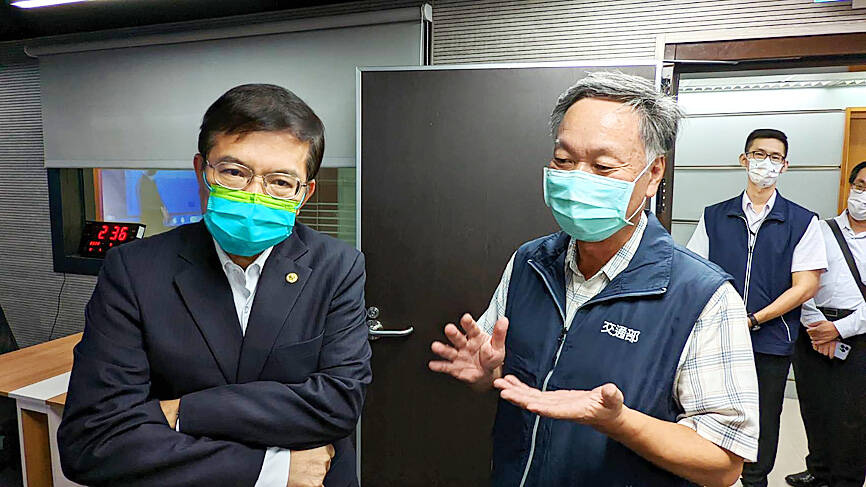A suspected Chinese surveillance balloon flying over the US was yesterday condemned by officials in Taipei and sparked calls for the government to plan countermeasures.
The Pentagon on Thursday said it had detected a Chinese surveillance balloon flying over the country.
Beijing has said the balloon is a civilian meteorological device that drifted into US territory after being blown off course.

Photo courtesy of the Central Weather Bureau
The National Security Bureau and Ministry of National Defense should investigate whether surveillance balloons could be used against Taiwan and prepare to respond to such acts, Chinese Nationalist Party (KMT) Legislator Johnny Chiang (江啟臣) said.
US Secretary of State Antony Blinken’s postponement of his visit to China as a result of the incident was a foreseeable consequence arising from the competition for power between the two countries, he added.
The Ministry of Foreign Affairs condemned China in a statement, saying that Beijing’s behavior breached international laws and was “unacceptable to the community of civilized nations.”

Photo: Cheng Wei-chi, Taipei Times
China should cease all activities that infringe on the sovereignty of other nations or cause instability in the region, it said.
Premier Chen Chien-jen (陳建仁) urged China to respect the sovereign airspace of other countries, as that would facilitate peace, mutual aid and cooperation between nations.
Lu Yeh-chung (盧業中), a professor in National Chengchi University’s Department of Diplomacy, said the balloon incident showed the “extreme lack of trust” between the US and China.
The two countries are likely to remain locked in competition for some time, Lu added.
That Blinken would delay a long-planned visit to Beijing over the incident hinted at other under-the-table disputes that might have occurred between the US and China while they were preparing for the visit, he said.
The strong response the incident elicited from Washington was diplomatically appropriate, as national security is an issue of utmost importance to the US, Lu said, adding that failing to send a clear signal could embolden China.
Similar balloons were first spotted in Japan’s Miyagi Prefecture in June 2020, although no country claimed ownership of the craft at the time, Central Weather Bureau Director-General Cheng Ming-dean (鄭明典) said.
Bureau personnel observed a balloon of the same type hovering over Taipei in September 2021, and members of the public reported seeing another in March last year, this time above Taipei International Airport (Songshan airport), he said.
The objects were in the two areas for about three hours and photographs were taken of them, Cheng said.
Civilian weather balloons — typically 2m wide and made of rubber — usually hover close to the launch site and at a height of no more than 30km, he said.
The Chinese balloons observed in the Taiwan incidents were no less than 20m wide, and their range and altitude suggest different materials were used to construct them, he said.
Additional reporting by Chou Ming-hung

MORE VISITORS: The Tourism Administration said that it is seeing positive prospects in its efforts to expand the tourism market in North America and Europe Taiwan has been ranked as the cheapest place in the world to travel to this year, based on a list recommended by NerdWallet. The San Francisco-based personal finance company said that Taiwan topped the list of 16 nations it chose for budget travelers because US tourists do not need visas and travelers can easily have a good meal for less than US$10. A bus ride in Taipei costs just under US$0.50, while subway rides start at US$0.60, the firm said, adding that public transportation in Taiwan is easy to navigate. The firm also called Taiwan a “food lover’s paradise,” citing inexpensive breakfast stalls

TRADE: A mandatory declaration of origin for manufactured goods bound for the US is to take effect on May 7 to block China from exploiting Taiwan’s trade channels All products manufactured in Taiwan and exported to the US must include a signed declaration of origin starting on May 7, the Bureau of Foreign Trade announced yesterday. US President Donald Trump on April 2 imposed a 32 percent tariff on imports from Taiwan, but one week later announced a 90-day pause on its implementation. However, a universal 10 percent tariff was immediately applied to most imports from around the world. On April 12, the Trump administration further exempted computers, smartphones and semiconductors from the new tariffs. In response, President William Lai’s (賴清德) administration has introduced a series of countermeasures to support affected

CROSS-STRAIT: The vast majority of Taiwanese support maintaining the ‘status quo,’ while concern is rising about Beijing’s influence operations More than eight out of 10 Taiwanese reject Beijing’s “one country, two systems” framework for cross-strait relations, according to a survey released by the Mainland Affairs Council (MAC) on Thursday. The MAC’s latest quarterly survey found that 84.4 percent of respondents opposed Beijing’s “one country, two systems” formula for handling cross-strait relations — a figure consistent with past polling. Over the past three years, opposition to the framework has remained high, ranging from a low of 83.6 percent in April 2023 to a peak of 89.6 percent in April last year. In the most recent poll, 82.5 percent also rejected China’s

PLUGGING HOLES: The amendments would bring the legislation in line with systems found in other countries such as Japan and the US, Legislator Chen Kuan-ting said Democratic Progressive Party (DPP) Legislator Chen Kuan-ting (陳冠廷) has proposed amending national security legislation amid a spate of espionage cases. Potential gaps in security vetting procedures for personnel with access to sensitive information prompted him to propose the amendments, which would introduce changes to Article 14 of the Classified National Security Information Protection Act (國家機密保護法), Chen said yesterday. The proposal, which aims to enhance interagency vetting procedures and reduce the risk of classified information leaks, would establish a comprehensive security clearance system in Taiwan, he said. The amendment would require character and loyalty checks for civil servants and intelligence personnel prior to